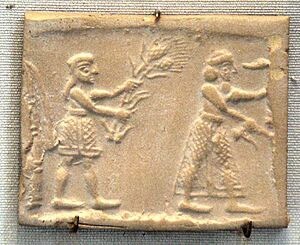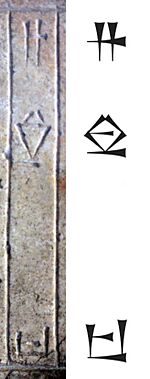Ensi (Sumerian) facts for kids
The Ensi was an important leader in ancient Sumer, a very old civilization in Mesopotamia (modern-day Iraq). Imagine a ruler or a prince of a small country that was just one city and the land around it – that's a city-state. The word "Ensi" itself meant something like "lord of the plowland," showing their connection to the land and farming.
At first, an Ensi might have been an independent ruler, like a king of their own city. But later on, the title often meant that the Ensi was under the command of a more powerful ruler called a lugal. Think of it like a governor who reports to a king.
Contents
What Was an Ensi?
A City's Special Leader
In the early days of Sumer, during a time called the Early Dynastic Period (around 2800–2350 BC), the Ensi was seen as a special representative of the city's main god or goddess. Each Sumerian city-state had a god or goddess they believed protected their city. The Ensi was like the god's chosen person on Earth, responsible for leading the city and keeping the god happy.
It's a bit tricky to tell the exact difference between the titles en, ensi, and lugal during this early time. Sometimes they seemed to mean similar things. However, the title Ensi might have been used mostly for the rulers of specific cities like Lagash and Umma.
Ensis and Kings
As time went on, especially in later periods, an Ensi was usually seen as being less powerful than a lugal. A lugal was more like a true king who ruled over several city-states. Even famous and powerful rulers, like Gudea from the Second Dynasty of Lagash (around 2100 BC), were still happy to be called Ensi. This shows that the title was still very respected.
Governors in a Big Kingdom
During the Third Dynasty of Ur (around 2100–2000 BC), the Sumerian lands were united into a larger kingdom. In this kingdom, the Ensi became like a provincial governor. They were in charge of different regions or provinces within the kingdom.
These Ensis had a lot of power. They managed the government, collected taxes, and made legal decisions in their areas. However, they were always watched over by the lugal (king) of Ur, the capital city. The king could appoint them to their position or even remove them if they didn't do a good job.
Even though an Ensi's job could sometimes be passed down from parent to child, the new Ensi always needed the king's approval. Also, these Ensis were not allowed to make their own foreign policy or start wars. All big decisions had to come from the king of Ur.
Ensis in Other Places
The idea of an Ensi wasn't just limited to Sumer. In the ancient city-state of Assur, the ruler who inherited their position also used a version of the Ensi title, but in the Akkadian language. In Assur, they believed their main god was the true "king" (called šarrum), and the human ruler was more like a chief priest or governor.
Early Political Power
The Ensis held a lot of political power in the Sumerian city-states during the Uruk period (around 4100–2900 BC). This was a very early time when cities were first growing and becoming important centers of life. The Ensi played a key role in organizing these early societies.



